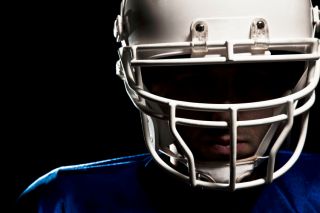Sexual Orientation
Michael Sam Coming Out
Michael Sam's declaration matters a lot, and here's why.
Posted February 13, 2014

When Michael Sam, the promising NFL draft hopeful, came out, there was a heartwarming chorus of cheering that followed. However among these jubilant voices were some that openly wondered: “Why did he have to do that? Who cares what his sexual orientation is?” Well, his coming out is important, very important and here’s why:
1) Michael Sam's coming out contributes to a groundswell of social change that includes the repeal of “Don’t Ask, Don’t Tell” rules outlawing openly gay and lesbian people to serve in the military, the repeal of laws prohibiting same-sex marriage at the Supreme Court, federal and state levels thus granting equal rights to same-sex couples in many regions of the country.
2) He is defying stereotypes that mistakenly portray gay men as not strong enough, tough enough or aggressive enough to play sports, especially a macho game like football. Remember the Rutgers basketball coach who derided a player by repeatedly calling him a faggot? As a gay Rutgers professor, I certainly do. Such behavior takes for granted the idea that homosexuality and aggressively competitive sports are absolutely incompatible. With one powerful statement, “I am an openly proud gay man,” Michael Sam helps render such an idea implausible.
3) Michael Sam is gay AND African American. Up until very recently, the few public figures who have come out have been, for the most part white. He along with Jason Collins, the former NBA player, provide role models—someone black gay kids can look up to and think, “Hey, there’s someone like me.” Being very successful in a sport that embodies traditional notions of masculinity no doubt provides a role model for many young gay men aspiring to be athletes, particularly young black gay men. In the communities where these youth live, Mr. Sam’s coming out has the potential to shatter myths and illusions. In my own research, I have found that there is enormous pressure for boys to grow into “strong black men” armored to battle racism with a veneer of hypermasculinity characterized by invulnerability, toughness, control, poise, emotional stoicism, pride, and hyper-heterosexuality—ready to have sex with women whenever the opportunity arises. Such expectations can be particularly acute and painful for young African American gay men who, due to their sexual orientation, are thought to be rejecting true black masculinity and further denigrating the already tarnished image of the black man in our society—and Mr. Sam's example can help vanquish this destructive notion.
Of course, Michael Sam’s coming out is not without its challenges and conundrums.
Take this quote from an NFL player; “Imagine if he’s the guy next to me, and you know, I get dressed, naked, taking a shower, the whole nine, and it just so happens he looks at me, how I am I supposed to respond?” This statement reflects several all too common but mistaken ideas that must be unpacked and addressed. First of all, because men are socialized to be the sexual pursuers rather than the pursued, there is a fear that gay men will aggressively come on to them and that they will not have the same feelings of control that usually comes with traditional sex roles. Straight men are not accustomed (as are women) to declining unwanted sexual advances by someone at least as physically powerful as themselves.
What adds to these feelings of vulnerability and anxiety are stereotypical notions and indeed phobias of gay men as sexual predators who indiscriminantly lust after straight men, seeking to overpower them through rape. Of course, in every group there are a few bad eggs, but for the most part, gay and bisexual men, like anyone else, (perhaps more so) dread rejection and won’t come on to someone if they don’t get some solid proof that my interest is reciprocated. I am a gay man who works out regularly, have been in many locker rooms and have looked at a lot of naked men (we ARE everywhere by the way). And when I do, the sky doesn’t fall. I would never make a move or a pass at a man without some encouragement from the object of my admiration, and if and when someone shows an interest in me that I don’t reciprocate, I have found a firm “thanks but no thanks” to be very effective. Many women are experts in dealing with unwanted sexual attention—so straight men worried about unwanted passes from their gay counterparts might check in with a sister, mother, girlfriend, adult daughter for tips. In the unlikely but not impossible event that unwanted attentions continue after your refusal, engage and activate the sexual harassment policies and procedures of your workplace or organization (or if they don’t exist, help develop them.)
Mr. Sam is indeed a pioneer, and like most groundbreakers in history, there are naysayers who warn this is going to hurt his future prospects. Time will tell. But my hope is that this is the beginning of a trend of more LGBT people coming out, resulting in not only further acceptance but also recognition and celebration of the contributions of a variety of people—including gay men whose presentations and behavior do not comply with traditional notions of gender. For sure, Mr. Sam’ is defying stereotypes and his coming out sends a message, “Yes, we can be tough and aggressive just like straight men”—OK fine. However, there are other gay men, who are not traditionally masculine but instead courageously defy gender stereotypes (i.e. RuPaul) and there also needs to room at the table for them along with their important contributions.


